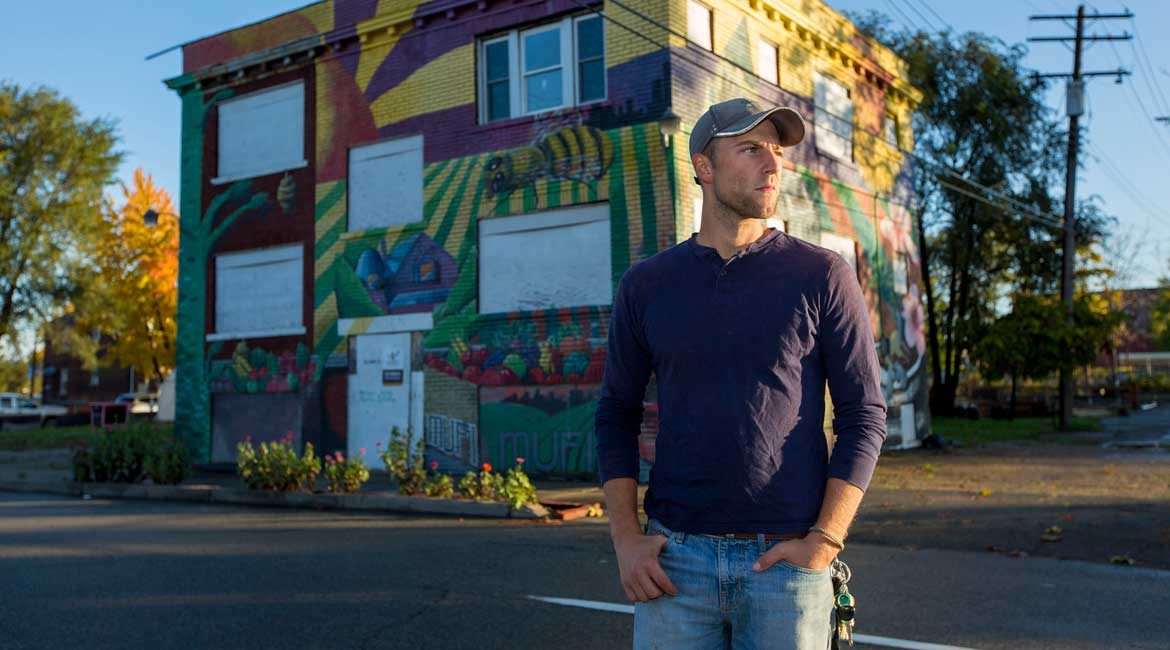Life in the ‘hood is changing for the good. Cities throughout North America are embracing the emerging agricultural neighborhood – agrihood – model as a residential development strategy. Currently, about 200 such sites across the US incorporate the working farm as a centerpiece for mixed residential land use. But, the Michigan Urban Farming Initiative (MUFI) is taking it one giant step further: transforming 2 square blocks in northern Detroit from a food desert into America’s First Sustainable Urban Agrihood.
The Michigan Urban Farming Initiative is a non-profit, 100 percent volunteer-run organization that seeks to engage members of the Michigan community in sustainable agriculture. Tyson Gersh, MUFI co-founder and president, says, “It’s about reimagining life in the urban environment. There is a major trend away from homogenized development – transitioning from two blocks of new, low-rise housing, to one block of green space and one block of repurposed existing buildings. Think Central Park, adjacent to all that nice architecture… but on a hyper-local, smaller scale. That’s what we’re working on here in Detroit.”
Primary focus is on the redevelopment of a two-square-block area in Detroit’s lower North End. With the theme “adaptive reuse of the built-environment,” MUFI plans to demonstrate best practices for sustainable urban agriculture, effective strategies for increasing food security, cost-competitive and scalable models for blight deconstruction, and innovation in blue & green infrastructure.
In the process, they are creating a broader redevelopment model for other communities. The MUFI urban agrihood includes a two-acre urban farm, 200-tree fruit orchard, children’s sensory garden and water harvesting cistern. More than 300 produce varieties are grown annually. The fresh vegetables are provided free to about 2,000 households, churches, food pantries and others within two square miles of the farm.
Repurposing with a purpose
The next phase in this ambitious agrihood project is transforming a long-vacant three-story former apartment building into a 3,200-square-foot Community Resource Center, with gathering space for educational programs and training. Such diverse subjects as nutritional literacy, agriculture, botany, food prep, and computer programming will be covered, as well as skill sets training for neighborhood residents.
Gersh says, “The opportunity here – the scope – has grown so much. We started in 2011 as a working urban farm and now the site is becoming a model for how things can be. Changes to the grid; housing and commercial development; building rehabilitation. When complete, our Community Resource Center will be one of the most sustainable, energy-efficient buildings in Detroit, using the latest innovations in building materials and systems.”
An abandoned greenhouse adjacent to the Community Center is also slated for rehab – as a healthy food cafe and food incubator, featuring fresh, farm-to-table food with ingredients from MUFI’s urban farm.
Organizations and individuals from around the globe volunteer at the MUFI site. Even in the winter. Student groups, companies, individuals – what started as farm work now involves neighborhood stabilization. One week in March saw volunteers from West Africa and Oklahoma gutting the interior of a blighted home, shovelling snow for seniors. The next week, Iowa University and Wayne State University volunteers were clearing trash and fallen branches after a windstorm; painting houses for individual residents. Of course, spring, summer and fall are all about the actual business of growing food.
Corporations for community
A viable, new sustainability project like the MUFI agrihood draws corporate attention. Green Standards, together with Herman Miller and GM, have diverted nearly 1,500 tons of GM office assets from landfill, and made nearly $200,000 worth of in-kind donations of surplus office furniture and equipment since the partnership launched late last year. And MUFI is happy to reap the rewards. In addition to furniture, Herman Miller is also providing interior design resources for the Community Resource Center.
BorgWarner, a global leader in clean technology solutions based in Auburn Hills, Michigan, helped launch a crowdfunding campaign with a $10,000 donation. And Green Standards donated $4500. Once the campaign reaches its crowdfunding goal of $50,000, the project will receive a matching grant made possible by the Michigan Economic Development Corporation (MEDC) Public Spaces Community Places program.
“Thoughtful initiatives like this have a large impact in community revitalization,” says MEDC Vice President of Community Development Katharine Czarnecki. “We are pleased to partner in and provide resources for the creation of a space that will provide health benefits, training opportunities and a gathering space to the residents of this neighborhood.”
The Public Spaces Community Places initiative started in 2014 with MEDC providing matched funding of up to $50,000 for community improvement projects throughout Michigan. As of February 1, 2017, the MEDC has provided $3,228,500 in matching grants. Communities, non-profits and other business entities can apply at https://patronicity.com/puremichigan
Gersh notes, “In the 5 years since our inception, MUFI has built strong working relationships with corporations. We wouldn’t be here without their support. GM has been with us since the beginning. Many companies like Herman Miller have an existing corporate program and are looking for outlets. Sometimes, it starts through a volunteer pipeline; someone will volunteer, then tell their boss this is a good opportunity for company involvement.
“BASF is another great community sponsor. They were touring Detroit with Sustainable Brands, stumbled across us, and contacted their supply chain about this ‘amazing project where you can showcase your technologies’. All sorts of dynamics are aligning with our Community Resource Center project.”
MUFI’s agrihood projects will be featured at Sustainable Brands ’17 Detroit global conference at the Cobo Convention Center, Detroit, May 22-25.
For more information, visit www.miufi.org or contact Tyson Gersh at 734.330.5691 tysongersh@miufi.org
